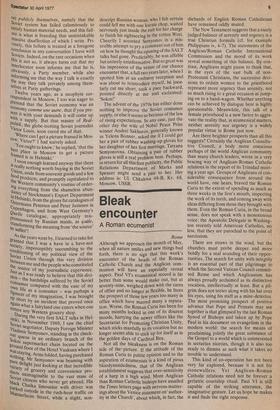Bleak encounter
A Roman ecumenist
Rome Although we approach the month of May, when all nature smiles and new things bud forth, there is no sign that this week's encounter of the heads of the Roman Catholic Church and the Anglican communion will have an especially vernal aspect. Paul VI's ecumenical record is far better than some would make out, but at seventy-nine, weighed down with the cares of office and no longer as flexible, he faces the prospect of those few years too many in office which have marred many a reputation. Worse, the Roman Curia has been for many months locked in one of its dourest moods, harrying the newer offices like the Secretariat for Promoting Christian Unity, which sticks manfully to its vocation but no longer seems able to stick up for itself as in the golden days of Cardinal Bea. Not all the bleakness is on the Roman side of the picture. If the attitude of the Roman Curia to public opinion and to the aspiration of ecumenists is a kind of pious bloodymindedness, that of the Anglican establishment suggests that over-sensitivity of a harp in a high wind. More Anglican than Roman Catholic bishops have assailed the Times letters page with nervous mutterings about the Venice statement on 'authority in the Church', about which, in fact, the
diehards of English Roman Catholicism have remained oddly muted.
The New Testament suggests that a nicely judged balance of serenity and urgency is a true Christian formula (cf. for example Philippians iv, 4-7). The statements of the Anglican/Roman Catholic International Commission and the mood of its work reveal something of this balance. By contrast, Anglicans might pause to think that, in the eyes of the vast bulk of nonProtestant Christians, the successive decisions to ordain women to the priesthood represent more urgency than serenity, not so much rising to a great occasion as jumping on to a band-wagon. Whether anything can be achieved by dialogue here is highly questionable. Meanwhile, this talk of a female priesthood is a new factor to aggravate the reality that, in ecumenical matters, neither serenity nor urgency is a widely popular virtue in Rome just now.
Are there brighter prospects than all this suggests? Certainly the Anglican Consultative Council, a body more conscious perhaps of the world Anglican community than many church leaders, wrote in a very bracing way of Anglican-Roman Catholic relations in the report of its Trinidad meeting a year ago. Groups of Anglicans of considerable consequence from around the world have, one hears, braved the Roman Curia to the extent of spending as much as three weeks in the lion's mouth, inspecting the work of its teeth, and coming away with ideas differing from those they brought with them. Even the Roman Curia, in the broad sense, does not speak with a monotonous voice: the Apostolic Delegate in Washington recently told American Catholics, no less, that they are parochial to the point of narcissism.
There are straws in the wind, but the churches must probe deeper and more boldly for a real sounding of their opportunities., The search for unity with integrity is an essential part of that pilgrimage to which the Second Vatican Council committed Rome and which Anglicanism has always proudly acclaimed as its distinctive vocation, intellectually at least. But a pil grim does not teeter along with his hat over his eyes, using his staff as a mine-detector.
The most promising prospect of -positive advance that Pope and Primate may see together is that glimpsed by the last Roman Synod of Bishops and taken up by Pope Paul in his document on evangelism in the modern world: the search for means of proclaiming joihtly the great substance of the Gospel to a world which is uninterested in sectarian niceties, though it is also too ready to dismiss as such what it takes no trouble to understand.
This kind of co-operation has not been very far explored, because it is not for stonewallers. Yet Anglican-Roman Catholic relations need not be forever a geriatric courtship ritual. Paul VI is still capable of the striking utterance, the imaginative gesture. Let us hope he makes it and finds the right response.


































 Previous page
Previous page